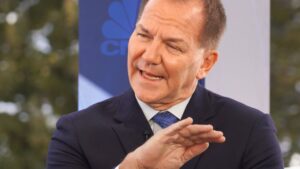Navigating the Unstable Financial Landscape: Insights from Paul Tudor Jones
Welcome to the Extreme Investor Network, where we bring you the latest and most insightful analyses of financial markets. In our constantly evolving economic climate, understanding the nuances of market dynamics is crucial for any successful investor. Today, we delve into the thoughts of billionaire hedge-fund manager Paul Tudor Jones, who recently shared his concerns regarding the stability of financial markets as we move into a new era of governance under President Donald Trump.
A Different Game: Economic Landscape Transformation
During a recent appearance on CNBC’s "Squawk Box," Jones emphasized that the financial markets today present a dramatically different landscape compared to 2017. He noted, "There are so many moving parts and cross currents," indicating that the interactions between various economic indicators are far more complex than before.
The Shifting Terrain of Debt and Ownership
One of the most significant changes Jones highlighted is the staggering increase in U.S. Treasury debt. The government has increased its debt issuance to unprecedented levels, more than doubling the numbers seen in 2017. This is a crucial factor for investors to consider, as it could indicate potential inflationary pressures on the horizon.
Additionally, foreign ownership of U.S. equities, debt, and real estate has surged. Today, foreigners hold twice as much of these assets as a percentage of GDP compared to 2017, positioning the United States in a unique yet concerning scenario. This shift can lead to increased volatility as international geopolitical dynamics play an even more vital role in the U.S. economy.
The Equity Market Conundrum
When we examine the stock market, the average price-to-earnings (P/E) ratio for the S&P 500 now hovers around 25, compared to 19 just a few years ago. Jones underscored the seriousness of this situation, suggesting that we could face a correction of up to 30% and still remain slightly overvalued.
This raises questions for investors: How do we adjust our portfolios in an environment that is so finely balanced? At Extreme Investor Network, we advocate thorough analysis and real-time data monitoring to make informed investment decisions.
The Trade War and Its Implications
Recent market movements have been influenced by Trump’s tariffs on several key U.S. trading partners, igniting fears of a potential trade war that could disrupt global supply chains, reignite inflation, and slow economic growth. While there was a moment of relief when Mexico’s president indicated a pause in tariffs, Jones cautions that the need for sound decision-making is critical during this volatile time.
He stated, "He’s my president now, I pray he makes all the right decisions, because we are precariously perched from a macro standpoint." The interconnected nature of today’s economy means that one misstep could have cascading consequences across various asset classes, making it essential for investors to stay diligent.
What’s Next for Investors?
To navigate this challenging environment, investors need to be proactive rather than reactive. Here at Extreme Investor Network, we recommend focusing on:
- Diversification: Spread out investments across multiple asset classes to mitigate risks.
- Real-Time Information: Use market news and analysis tools to stay updated on global economic shifts.
- Long-Term Planning: While short-term market trends can be tempting, maintaining a long-term perspective will help safeguard investments against volatility.
Jones, known for his foresight during the 1987 stock market crash, is a testament to the importance of vigilance and adaptability in investment strategies. As the chair of nonprofit Just Capital, he also reminds us that social and environmental factors are increasingly relevant in assessing a company’s worth and impact.
Conclusion
The financial landscape may indeed be more unstable than ever, but with the right approach and resources, such as those offered by Extreme Investor Network, investors can navigate these turbulent times successfully. By remaining informed and agile, we can better position ourselves for future opportunities while minimizing risks. Stay connected with us as we provide ongoing insights into the evolving financial world.

